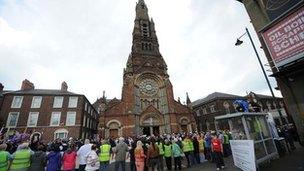Parades Commission not going anywhere
- Published
- comments

Disturbances broke out as a parade passed St Patrick's church in north Belfast
So the head of the Parades Commission, Peter Osborne, says the time is right for local politicians to take responsibility for parades.
In the wake of the unedifying disturbances outside St Patrick's church in Belfast's Donegall Street, Mr Osborne has criticised the decision by leading unionists including Peter Robinson to put their names to an open letter which described his commission's decision to prevent a loyalist band from marching past the church as "monstrous".
The letter to the Northern Ireland Office claimed the Secretary of State Owen Paterson had washed his hands in a "Pontius Pilate" way, ignoring the incompetence of the Commission.
Once again it demanded the body's disbandment.
Although parades remain the responsibility of direct rule ministers, the Stormont parties have been struggling to design a "new and improved framework" for marching ever since the Hillsborough agreement on justice, external in February 2010.
A DUP-Sinn Fein working party set up then produced a draft bill, external in April 2010.
It set out proposals for two new bodies, an office where people apply for permission to hold a parade or a protest, and an 11-strong adjudication body charged with deciding what happens in the event of a dispute.
When Mr Osborne calls for the management of parades to be devolved, he isn't suggesting that MLAs should themselves make decisions about which marches can or can't go ahead.
Instead he is arguing that they should take responsibility for setting up a new parades type commission, answerable to Stormont not the Northern Ireland Office.
The problem with the April 2010 bill was that it didn't become law.
The Orange Order rejected it after the DUP lost a tug of war within the Grand Orange Lodge with those who shared the doubts about the new structures voiced by both Traditional Unionist and Ulster Unionist politicians.
The development of a new flashpoint at St Patrick's Church and the ensuing exchanges between unionists and nationalists, church leaders and the loyal orders makes the resolution of the running sores associated with parades more urgent.
But as I wrote on 12 July, simply changing the name on the brass plate above a parading quango's door is no guarantee of success.
Stormont returns next week. Whilst complaining about the secretary of state may provide an easy headline, the parties know any lasting solution will lie in local hands.
Ordinarily MLAs would have a breathing space around now, with the marching season over, to revisit their proposals.
But the fact that a march commemorating the Covenant is due to make its way past St Patrick's Church at the end of September complicates the situation.
Peter Osborne could be continuing what he admits is the thankless task of adjudicating marching disputes for some time to come.